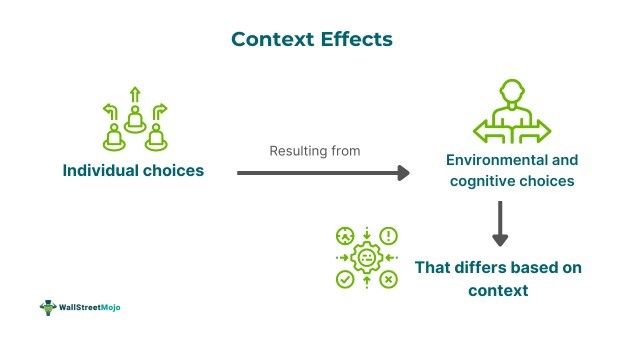Table of Contents
Context Effects Definition
Context effects an individual's perception and interpretation of stimuli based on various determinants. These include cognitive, environmental and situational variables. It studies the impact of these variables based on the stimuli in one's comprehension and recall of past events.

The effect is studied widely from a behavioral economics point of view as its impact spreads across all fields, including investments. They are known to have impacts on memory, learning abilities, recognition etc. The responses can be limited to various factors. Similarly, the intensity of familiar stimuli can also vary with the number of times they experience it.
Key Takeaways
- Context effect psychology theory suggests that a surrounding stimulus influences cognition and memory and has impacts on decision-making.
- Choices are made on the basis of cognitive, situational and environmental contexts. The influence of the can vary depending on the intensity of the same situation presented at different times.
- There are three major types: similarity effect, compromise effect and attraction effect.
- Understanding these effects helps individuals make better financial decisions and reasons why they were made. It helps businesses to make better pricing decisions.
Context Effects In Behavioral Finance Explained
Context effects theory states that cognition and memory are dependent on the context, and these help individuals arrive at decisions. Context refers to the stimuli that help individuals arrive at certain decisions. It refers to the systematic changes in one's behavior or reaction depending on the stimuli. The stimuli can be influenced by the composition of the environment and situational and cognitive perceptions.
Individual choices often depend on the available alternatives among which an option is chosen. This is the essence of the context effect. The individual may not make the same set of choices given there are different circumstances. This effect has important implications for product offerings, pricing policies, etc.
The effect manifests itself when the perception of objects changes when the context changes without changes in the object itself. Behavior economics and context effect are two areas that help us understand the factors and reasons behind everyone's influence on decision-making. The former helps in understanding the factors that influence decision-making and, later, the factors or contexts that play a role in determining individual choices.
They are especially helpful in financial contexts. Choosing financial products and decisions involves complex thinking. Individuals have varied levels of options, be it bank accounts, deposits, loans, or credits concerning requirements, interest rates, terms and other factors.
Many traders use Saxo Bank International to research and invest in stocks across different markets. Its features like SAXO Stocks offer access to a wide range of global equities for investors.
Types
There are three common types of effects (especially in marketing and finance) they are:
- The similarity effect
- The compromise effect and
- The attraction effect
1. Similarity Effect
The context effects psychology impact takes form when an individual's choice and the reasoning behind the initial choices change when a third option that is similar to the initial options is introduced. The brain tends to group similar choices. This makes the probability of choosing the other option than the one preferred gets reduced even further.
2. Compromise Effect
The effect takes form when individuals have a preferred option as a compromise of other options. This happens when there are extreme options available. The chosen option, hence, will be a neutral one regardless of the characteristics of the choices.
3. Attraction Effect
The effect takes place when the additional choice makes the initial option shine out. The individual's preference is amplified with the addition of options.
Examples
Let us look into some examples to understand the concept better.
Example #1
Imagine, Dan is an investor and he was analyzing two health sector stocks. A and B had strong growth potential and were already making profits. He was inclined to A more because they were environmentally conscious, and their packaging reflected it. The other choice was to fetch him more profit. He was confused and went on to include a third stock, C, which also had similar potential. But then again, they were not environmentally conscious. Even though C could give him an additional profit, he chose to stick with A as it shone for him and grouped B and C to reject them.
Example #2
A study was conducted to investigate the context effect in working visual memory and hybrid visual search inhibitory control.
It enhances understanding of real-world scenarios involving multiple targets and contextual information. The research used photo-realistic scenes and real-world applications such as medical imaging and airport security. The study focuses on finding the impact of individual differences in working memory through search outcomes. It employs a drift-diffusion model to analyze such behaviors. However, the study lacked systematic category manipulation and controlled fixation times. The study offers insights into hybrid search behaviors and questions on the visual working memory functions.
Effects
Below are some of the effects of the theory, and they are as follows.
- The theory has a significant effect on decision-making, recalling ability and communication.
- It can help individuals choose the best alternative decisions from the available alternatives.
- All effects are not positive. Sometimes, it makes individuals make choices that lack objectivity and are influenced by situations rather than based on facts.
- It helps marketers study the general population and understand consumer behavior. The knowledge hence helps in marketing, placement of the product and pricing.
- It helps individuals understand that certain financial decisions may seem attractive only in the given circumstances. This helps them bring in additional perspective and the opportunity to implement a different choice.
- It helps individuals make better financial decisions in general.
Disclosure: This article contains affiliate links. If you sign up through these links, we may earn a small commission at no extra cost to you.

